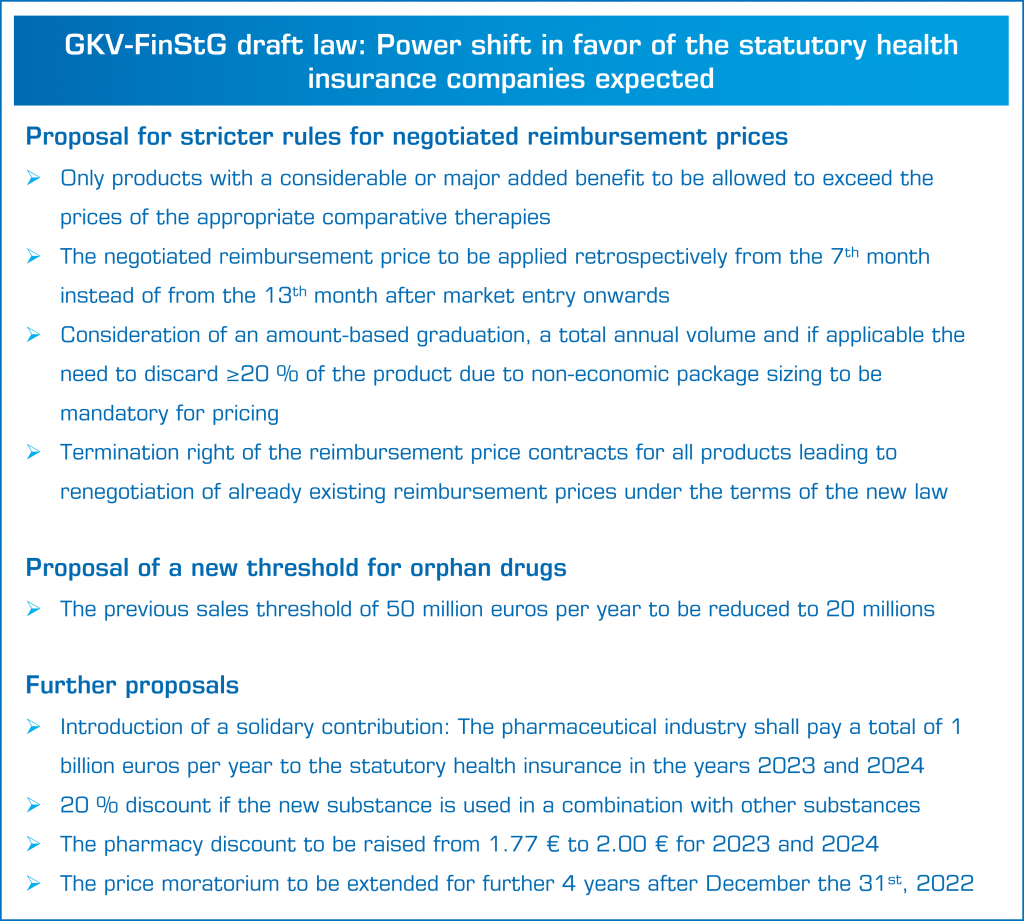The German Federal Ministry of Health has published a draft law on the financial stabilization of the statutory health insurance (GKV-FinStG). The subjects of the draft are amendments to the Social Code Book V, in particular Articles § 35 a and § 130 b, which include the early benefit assessment of new active substances and the subsequent price negotiations with the statutory health insurance (SHI). Additionally, two new Articles § 130 e and §130 f have been added. The following summarizes the consequences for health technology developers (HTDs) on the German market.
Stricter rules for negotiated reimbursement prices (§ 130 b)
§ 130 b (1a) suggests considering an amount-based graduation or a total annual volume for the negotiations of the reimbursement prices. According to the new draft law these considerations will become mandatory. Furthermore, § 130 b (1b) will be added to include a price reduction if more than 20 % of the product need to be discarded due to non-economic package sizing.
Additionally, the new draft law intends to apply the negotiated reimbursement price from the 7th month instead of the 13th month after market entry. This reduces the period of free pricing from 12 to 6 months.
Furthermore, the new draft law intends to modify § 130 b (3). The determination of the added benefit during the early health technology assessment will be even more important for the negotiation of the reimbursed price:
- No added benefit: The reimbursed price must be 10 % lower than the appropriate comparative therapy (ACT)
- Added benefit not proven: The reimbursed price must be reasonably lower than the ACT
- Non-quantifiable and minor added benefit: The reimbursed price must be on the same level as the ACT
- Considerable or major added benefit: no restriction
Of note, number 1 and 3 only apply if the ACT is patent-protected and document-protected. If a patent-protected ACT has not been subject to the early benefit assessment in Germany, a discount of 15 % on the annual therapy costs will be applied.
Furthermore, § 130 b (7a) is to be amended to allow for termination of the reimbursement price contracts for all medical products. After termination, new prices have to be negotiated immediately. This could open the door for renegotiation of the products for which reimbursement prices already exist under the terms of the new law.
New threshold for orphan drugs (§ 35 a)
According to § 35 a (1), the additional medical benefit of orphan drugs is deemed to be proven by the marketing authorization and a comparison with an ACT does not have to be presented. However, if the annual sales of an orphan drug exceed a certain threshold, a full evidence dossier must be submitted for re-evaluation of the added benefit. The new draft law intends to lower the current threshold of 50 million euros to 20 million euros. A reduction of this threshold would mean that many HTDs with orphan drugs whose annual sales are currently between 20 – 50 million would need to resubmit a full dossier within a very short amount of time after the approval of the draft law (expected by the end of this year).
Introduction of a solidary contribution (§ 130 f)
In the years 2023 and 2024 HTDs who offer patented active substances or orphan drugs on the German market will have to pay a total of 1 billion euros annually to the SHI. The SHI will unilaterally determine the extent of the contribution of each individual HTD. Calculation of the contribution will be based on HTD’s respective share of SHI expenses during the previous calendar year. HTDs will have the chance to apply for exclusion due to exceptional economic reasons which would lead to undue hardship for the respective HTD.
Other aspects
The new Article § 130 e will be introduced which includes a 20 % combination discount on the reimbursed price if medicinal products with new active ingredients are used in a combination with other substances.
The pharmacy discount will be raised from 1.77 euros to 2.00 euros for the years 2023 and 2024.
The price moratorium will be extended for further 4 years after December the 31st, 2022.
Summary
The new draft law intends to impose stronger regulations on the negotiation of reimbursed prices by strengthening the position of the SHI. Only products with a considerable or major added benefit will be allowed to exceed the reimbursed prices of the ACT. Therefore, it will be even more important to provide clinical evidence of the best possible quality. This also seems to apply to orphan drugs as the new sales threshold of 20 million euro per year means that more orphan drug products need to undergo reevaluation by the Federal Joint Committee.
